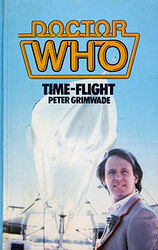
There are 2 reviews so far. To add a review of your own for this item, visit the voting page.
| By: | the Traveller, Kalid's Chamber |
|
| Date: | Saturday 25 February 2006 |
|
| Rating: |    5 5 |
A very average, straight from the script novelisation which is just as flawed as the televised version and adds nothing new to the story.
 |  |  |

 | Weak Novelization of Weak Story |
|
 |  |  |
| By: | David Layton, Los Angeles, United States |
|
| Date: | Saturday 16 December 2017 |
|
| Rating: |    3 3 |
Time-Flight was one of the lesser Davison-era stories. Part of this was down to the we've-run-out-of-money sets and effects. Another part was a seemingly hastily written script that peculiarly involves The Master seemingly shoe-horned into a story that might not have been written for him. That is how it feels, even if that may not be the case. We return to Heathrow Airport, last featured in The Faceless Ones from 1967. As with that story, once more we have a missing plane with passengers. This time, though, rather than taking a ride to low Earth orbit, they take a ride to prehistoric Earth. The TARDIS gets sidetracked by the time meddling and the Doctor has to pull out the UNIT card, making him suddenly involved in the whole affair. The story continues the approach to The Master that John Nathan-Turner would favor through his time running the show. The Master is heavily disguised, only to be revealed as The Master after half the story has gone by. Also, The Master is greatly reduced as an adversary. His main motive is to save himself rather than to take over the universe. His motivation is desperation rather than domination, and it greatly reduces any threat potential The Master may have. This, too, is typical of the Nathan-Turner era Master stories. One major problem with this story is that there is no clear reason for The Master to be in disguise, and none is given. Add to this several plot holes and overly convenient ways out of dead-end situations and one concludes that the story needed serious revision. Peter Grimwade's approach to novelizing his story is to focus on the "for children" brief from Target, so that there are many clumsy explanations that read as if a presenter from Blue Peter were telling the story. It's a brisk read, but insignificant.


